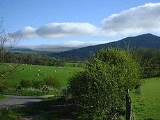
poet
of the post-Roman period
whose work has possibly survived in a Middle Welsh manuscript, the Book of Taliesin
. Taliesin was a renowned bard
who is believed to have sung at the courts of at least three Celtic British kings.
A maximum of eleven of the preserved poems have been dated to as early as the 6th century, and were ascribed to the historical Taliesin.
Which was first, is it darkness, is it light? Or Adam, when he existed, on what day was he created? Or under the earth’s surface, what the foundation? He who is a legionary will receive no instruction.
![]()
Let them make their war. Whence come night and day? Whence will the Eagles|eagle become gray? Whence is it that night is dark? Whence is it that the linnet is green? The ebullition of the sea, How is it not seen?
![]()
There are three fountains In the mountain of roses, There is a Caer|Caer of defence Under the ocean’s wave. Illusive greeter, What is the porter’s name?
![]()
Who was confessor To the gracious Son of Mary? What was the most beneficial measure Which Adam accomplished?
![]()
Whence come night and flood? How they disappear? Whither flies night from day; And how is it not seen?
![]()
Excellent in every way around the glens The two skilful ones make inquiries
![]()
The Welsh people|Cymry will be lamenting While their souls will be tried Before a horde of ravagers. The Cymry, chief wicked ones, On account of the loss of holy wafers.
![]()
I am old. I am young. I am Gwion, I am universal, I am possessed of penetrating wit.![]()
I am a bard; I will not disclose secrets to slaves; I am a guide: I am expert in contests. If he would sow, he would plough; he would plough, he would not reap. If a brother among brothers, Didactic Bards with swelling breasts will arise Who will meet around mead-vessels, And sing wrong poetry And seek rewards that will not be, Without law, without regulation, without gifts. And afterwards will become angry.
![]()
There will be commotions and turbulent times, Seek no peace — it will not accrue to thee. The Ruler of Heaven knows thy prayer. From his ardent wrath thy praise has propitiated him The Sovereign King of Glory addresses me with wisdom Hast thou seen the dominus fortis? Knowest thou the profound prediction domini?
![]()

